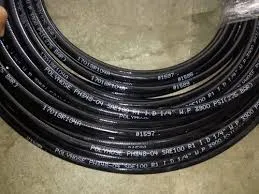Okt . 18, 2024 18:03 Back to list
CE Certification for PTFE Hose Products Compliance and Quality Assurance
Understanding CE Certification for PTFE Hose Products
In today's global market, the demand for high-quality industrial components such as hoses has grown exponentially. Among the various types of hoses, PTFE (Polytetrafluoroethylene) hoses have carved a niche due to their unique properties and capabilities. However, in order to ensure safety, reliability, and compliance, CE certification has become an essential requirement for PTFE hose products, particularly when marketed in Europe.
What is CE Certification?
CE certification is a mark that signifies a product's adherence to European Union (EU) safety, health, and environmental protection standards. It is mandated for products that fall under specific EU directives and regulations. When a product bears the CE mark, it indicates that it has undergone a thorough assessment and is deemed fit for the European market. This certification is crucial not only for product legitimacy but also for consumer safety, as it assures users that the product meets rigorous standards.
Importance of CE Certification for PTFE Hoses
1. Safety Assurance PTFE hoses are widely used in industries that require the transport of aggressive chemicals, high temperatures, or high pressures, such as the pharmaceutical, food processing, and petrochemical sectors. CE certification assures that these hoses can handle the demands of such applications safely, reducing the risk of leaks or failures that could lead to hazardous situations.
2. Market Access For manufacturers, obtaining CE certification is vital for accessing the European market. Without this certification, companies cannot legally sell their PTFE hose products in the EU. This can significantly limit market potential and financial growth.
3. Competitive Advantage The CE mark can serve as a competitive differentiator. Products that are CE certified may be perceived as higher quality by consumers compared to non-certified alternatives. This perception can drive sales and establish a reputable brand image in a competitive landscape.
4. Regulatory Compliance Compliance with EU regulations is not only about gaining access to the market; it is also about avoiding legal repercussions. Manufacturers who neglect CE certification may face fines or bans on their products, significantly impacting their operations and profitability.
The Process of Obtaining CE Certification
ce certification ptfe hose products

The process to obtain CE certification for PTFE hoses involves several steps
1. Determine Applicable Directives The first step is identifying which EU directives apply to the PTFE hose products. Common directives may include the Pressure Equipment Directive (PED) and the Machinery Directive.
2. Product Testing The hoses must undergo rigorous testing performed by accredited laboratories. This testing ensures that the products meet specific safety and performance standards. Tests may include pressure testing, temperature resistance assessments, and compatibility with various chemicals.
3. Documentation Manufacturers must compile technical documentation demonstrating that their products comply with the requisite directives. This documentation must include design and manufacturing processes, test results, and a Declaration of Conformity.
4. Quality Management System Implementing a robust quality management system (QMS) also plays a crucial role in maintaining compliance. It ensures continual adherence to manufacturing standards and product quality through systematic processes.
5. Affixing the CE Mark Once a product meets all necessary requirements and passes testing, manufacturers can affix the CE mark to their PTFE hoses, indicating compliance and readiness for market distribution.
Challenges and Future Perspectives
While obtaining CE certification is beneficial, manufacturers may face challenges such as the cost of testing and the complexities of navigating EU regulations. However, the importance of CE marking will only increase as regulatory bodies emphasize product safety and sustainability.
The future of PTFE hose products is bright, especially as industries become increasingly aware of environmental standards and the need for reliable components. CE certification will continue to serve as a beacon of quality and trust, paving the way for innovative applications and greater consumer confidence.
In conclusion, CE certification for PTFE hose products is an indispensable element in the modern industrial landscape. It ensures safety, compliance, and market acceptance, ultimately facilitating smoother business operations and fostering growth within the European Union. Companies that prioritize obtaining CE certification will not only meet regulatory requirements but also strengthen their market presence and consumer trust in an increasingly competitive environment.
-
Best Four Steel Wire Spiral Hose Hydraulic R12 – Durable High-Pressure Hose Manufacturer
NewsJul.08,2025
-
High-Quality 1/4 Hydraulic Hose – Soft, Flexible & Durable Rubber Hoses for Industrial Use
NewsJul.08,2025
-
1 1 2 Inch Hydraulic Flexible Hose - Durable, Reliable, High-Pressure Solutions
NewsJul.07,2025
-
High-Quality 1 2 Rubber Hose - Durable, Flexible Hydraulic Solutions
NewsJul.07,2025
-
Discover SAE Hydraulic Hose Types - High Quality & Durable Hoses from Leading Factory Supplier
NewsJul.06,2025
-
High Pressure Wire Hydraulic Rubber Hose Supplier Durable & Reliable 1SN Hose Solutions
NewsJul.06,2025
